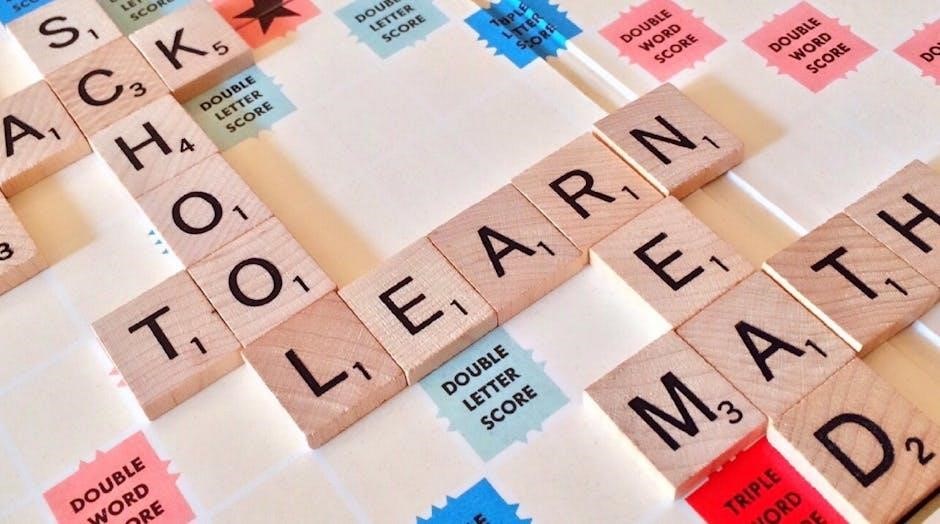Year 2 English worksheets are structured tools designed to enhance literacy skills in young learners aged 6-7. These resources cover grammar, reading, vocabulary, and writing, offering engaging activities to build confidence and fluency. Available in PDF format, they provide convenient, interactive learning opportunities for both classroom and home use.
Overview of Year 2 English Curriculum
The Year 2 English curriculum focuses on building foundational literacy skills through structured activities. It covers grammar, reading comprehension, vocabulary, and writing, tailored for students aged 6-7. Worksheets often include exercises on nouns, verbs, adjectives, and sentence structure. Reading tasks involve fiction, non-fiction, and poetry to enhance understanding. Vocabulary expansion is achieved through word recognition and spelling practice. Creative writing prompts and storytelling activities encourage self-expression. The curriculum emphasizes the development of clear communication skills, preparing students for more complex language tasks in subsequent years. Interactive PDF worksheets make learning engaging and accessible for young learners.
Importance of Worksheets in Year 2 English Learning
Worksheets play a vital role in Year 2 English learning by providing structured, engaging activities that reinforce foundational literacy skills. They cater to areas such as grammar, reading comprehension, vocabulary, and writing, ensuring consistent practice. Worksheets in PDF format are easily accessible and convenient for both classroom and home use. Interactive and creative exercises keep students motivated while building confidence. Regular use of these resources helps track progress and identify areas needing improvement. By offering a variety of tasks, worksheets ensure a well-rounded approach to language development, making them an essential tool for young learners.
Benefits of Using PDF Format for Worksheets
The PDF format offers numerous advantages for Year 2 English worksheets, ensuring accessibility and convenience. PDFs are easily downloadable and printable, making them ideal for both classroom and home use. They maintain consistent formatting across devices, preserving the layout and design of activities. Interactive PDFs can include clickable features, enhancing engagement. Additionally, PDFs are shareable without risking content alteration, providing a reliable resource for teachers and parents. Their versatility and compatibility with various devices make PDFs a practical choice for delivering structured, engaging English learning activities to Year 2 students. This ensures seamless access to essential literacy tools.

Key Components of Year 2 English Worksheets

Year 2 English worksheets typically include grammar exercises, reading comprehension activities, vocabulary building, and writing skills development. These components are designed to cover the curriculum comprehensively.
Grammar Exercises
Grammar exercises in Year 2 English worksheets focus on foundational skills such as identifying nouns, pronouns, verbs, adjectives, and adverbs. Activities include sentence formation, punctuation practice, and capitalization rules. These exercises help students understand sentence structure and word types, fostering clear communication. Interactive tasks, like identifying parts of speech in sentences, make learning engaging. Worksheets often include fill-in-the-blank, matching, and short-answer questions to reinforce grammar concepts. Regular practice with these exercises builds confidence and improves accuracy in using grammar correctly. They are essential for meeting curriculum goals and developing strong language skills.
Reading Comprehension Activities
Reading comprehension activities in Year 2 worksheets involve engaging texts, including fiction, non-fiction, and poetry. These exercises help students develop critical reading skills by answering questions about characters, settings, and main ideas. Interactive tasks, like identifying themes and summarizing stories, enhance understanding. Worksheets often feature colorful visuals and themed texts, making learning enjoyable. Activities also include identifying genres and predicting outcomes, fostering a deeper connection with the material. These exercises prepare students for more complex texts and build a lifelong love for reading. Regular practice improves fluency and comprehension abilities, essential for academic success.
Vocabulary Building Exercises
Vocabulary building exercises in Year 2 worksheets help students expand their word knowledge through engaging activities. These include word recognition, spelling practice, and exercises on synonyms, antonyms, and compound words. Interactive tasks, such as matching games and crossword puzzles, make learning fun. Worksheets often feature themed vocabulary related to topics like holidays, seasons, and everyday objects. By practicing these exercises, students improve their ability to understand and use words effectively in sentences. These activities also enhance communication skills and confidence in expressing ideas clearly. Regular practice ensures a strong foundation for future language development.
Writing Skills Development
Writing skills development is a key focus in Year 2 English worksheets, helping students improve their ability to express ideas clearly. Activities include sentence formation, creative writing prompts, and journaling exercises. Worksheets often provide structured tasks, such as writing short stories or describing pictures, to encourage creativity. Practice in spelling and grammar reinforces foundational skills, while guided prompts help students organize their thoughts. These exercises build confidence and fluency, preparing students for more complex writing tasks in the future. Regular practice with these activities ensures steady progress in communication and self-expression.

Grammar-Focused Worksheets
Grammar-focused worksheets provide structured practice in key areas like nouns, verbs, and punctuation, helping Year 2 students build a strong foundation in English grammar.
Nouns and Pronouns
Worksheets on nouns and pronouns help Year 2 students identify and use these effectively. Activities include recognizing common and proper nouns, understanding singular and plural forms, and correctly using personal pronouns like ‘he’ and ‘she.’ These exercises reinforce foundational grammar skills, ensuring clarity in communication. Interactive tasks, such as matching games and sentence completion, make learning engaging while building a solid grammatical base for future learning. These resources are designed to make grammar fun and accessible for young learners, fostering confidence in their language abilities.
Verbs and Tenses
Year 2 English worksheets focus on understanding verbs and tenses, introducing students to action words and their forms. Activities include identifying verbs in sentences, distinguishing between present and past tense, and completing exercises to practice correct usage. These exercises help students grasp how verbs convey actions and events, forming clear and meaningful sentences. The worksheets also explore simple future tense concepts, enabling learners to describe sequences of actions. Interactive PDF features, such as fill-in-the-blank tasks, make learning verbs engaging and effective, ensuring young students build a strong foundation in verb usage and tenses.
Adjectives and Adverbs
Year 2 English worksheets emphasize the use of adjectives and adverbs to enhance sentence description and clarity. Activities include identifying adjectives in sentences, creating descriptive paragraphs, and distinguishing between adjectives and adverbs. These exercises help students understand how adjectives describe nouns and adverbs modify verbs, adjectives, or other adverbs. Worksheets often feature colorful visuals and interactive tasks, such as matching games or fill-in-the-blank exercises, to make learning engaging. By practicing with these resources, students improve their ability to use descriptive language effectively, adding depth and detail to their writing and speech. This skill is foundational for clear communication.
Punctuation and Capitalization
Year 2 English worksheets focus on teaching proper punctuation and capitalization rules to improve writing clarity. Activities include identifying and correcting punctuation errors, understanding full stops, commas, and question marks, and practicing capital letters for names, sentences, and special occasions. Worksheets often feature exercises where students complete sentences with missing punctuation or rewrite sentences with correct capitalization. These tasks help students develop essential writing skills, ensuring their texts are readable and grammatically correct. Interactive PDF formats make learning engaging, while progress tracking tools allow teachers and parents to monitor improvement effectively. Mastery of punctuation and capitalization boosts confidence in written communication.

Reading Comprehension Worksheets
Reading comprehension worksheets for Year 2 students include engaging activities with fiction, non-fiction, and poetry texts. These exercises aim to improve understanding, critical thinking, and vocabulary skills. Interactive PDF features and themed topics like holidays or seasons make learning enjoyable. Worksheets often contain questions to assess comprehension and encourage independent reading. They are designed to prepare students for future academic challenges while fostering a love for reading. Regular practice with these resources supports overall literacy development.
Fiction and Non-Fiction Texts
Fiction and non-fiction texts in Year 2 reading comprehension worksheets cater to diverse learning needs. Fiction texts often include engaging stories with colorful visuals, while non-fiction texts introduce factual information on topics like animals or seasons. These resources are designed to develop critical thinking and vocabulary skills. Interactive PDF features and themed topics like holidays or seasons make learning enjoyable. Worksheets often contain questions to assess comprehension and encourage independent reading. They are designed to prepare students for future academic challenges while fostering a love for reading. Regular practice with these resources supports overall literacy development.
Poetry and Rhyming Activities
Poetry and rhyming activities in Year 2 English worksheets engage students with fun and creative language exercises. These resources often include colorful visuals and interactive rhyming games to capture young learners’ attention. Worksheets typically feature tasks such as identifying rhyming words, completing rhyming couplets, and analyzing simple poems. These activities help develop phonological awareness, vocabulary, and creative writing skills. Many PDF worksheets incorporate seasonal or themed poetry, making learning relevant and enjoyable. By exploring rhythm and rhyme, students build foundational skills that enhance their overall literacy and creativity. These exercises are designed to make learning fun while fostering a lifelong love for language.
Question Types and Answering Techniques
Year 2 English worksheets often include exercises focused on various question types to enhance reading comprehension. Students learn to identify literal, inferential, and evaluative questions, improving their understanding of texts. Worksheets feature activities like true/false questions, sequencing events, and identifying main ideas. These exercises help children develop critical thinking and effective answering techniques. Many PDF resources incorporate colorful visuals and engaging layouts to make learning interactive. By practicing different question types, students build confidence in tackling a range of comprehension tasks, preparing them for assessments and fostering independent reading skills. These activities ensure a solid foundation in understanding and interpreting texts.

Vocabulary Building Activities
Year 2 English worksheets focus on expanding vocabulary through word recognition, spelling, synonyms, antonyms, and compound words. Interactive PDF exercises make learning engaging and effective.
Word Recognition and Spelling
Word recognition and spelling exercises in Year 2 English worksheets help students identify and write common words. Activities include matching games, fill-in-the-blanks, and tracing letters. These exercises improve decoding skills, enabling better reading fluency. Spelling practice focuses on vowel sounds, consonant blends, and high-frequency words. Interactive PDF features allow pupils to test their spelling online, providing immediate feedback. These tools build a strong foundation for literacy, making learning enjoyable and effective for young learners. Regular practice with these worksheets enhances overall language proficiency and confidence in spelling.
Synonyms and Antonyms
Synonyms and antonyms exercises in Year 2 English worksheets help students expand their vocabulary by exploring word meanings. Activities include matching games, word sorting, and creating sentences with opposite or similar words. These exercises improve comprehension and enhance communication skills. Interactive PDF features allow pupils to engage with visual aids and puzzles, making learning fun. By mastering synonyms and antonyms, young learners develop critical thinking and language fluency. These activities are designed to be both educational and enjoyable, fostering a deeper understanding of word relationships and their practical use in everyday language.
Compound Words and Phrases
Compound words and phrases activities in Year 2 English worksheets introduce students to combining words to form new meanings. Exercises include matching, puzzles, and creating compound words from given parts. These tasks enhance vocabulary and spelling skills, encouraging creativity. Interactive PDF features like drag-and-drop games make learning engaging. By understanding compound words, students improve their reading and writing abilities, recognizing how smaller words form larger ones. These activities are designed to be both fun and educational, fostering a strong foundation in word building and language exploration.

Writing Skills Development
Compound words and phrases activities in Year 2 English worksheets introduce students to combining words to form new meanings. These exercises include matching games, word puzzles, and creating compound words from given parts. Such tasks enhance vocabulary and spelling skills while encouraging creativity and problem-solving. Interactive PDF features, like drag-and-drop games, make learning engaging and fun. By mastering compound words, students improve their reading and writing abilities, recognizing how smaller words can unite to form larger ones. These activities are designed to be both educational and enjoyable, fostering a strong foundation in word building and language exploration.
Creative Writing Prompts
Creative writing prompts in Year 2 English worksheets encourage students to express their imagination and develop storytelling skills. These prompts often include fun and engaging topics, such as “A Day in the Life of a Magic Object” or “Imagine You Are an Animal.” Activities are designed to spark creativity, with structured exercises like writing short paragraphs or completing sentences. Interactive PDF features allow students to type directly into the worksheet, making the process enjoyable and accessible. These prompts help build confidence in writing, fostering a love for creative expression and improving language use. They are perfect for both classroom and home learning environments.
Sentence Structure and Formation
Sentence structure and formation exercises in Year 2 English worksheets help students build clear and grammatically correct sentences. Activities include identifying sentence parts, arranging words correctly, and creating simple and compound sentences. Worksheets often provide fill-in-the-blank exercises, word ordering tasks, and sentence completion games. These exercises reinforce grammar rules, such as capitalization and punctuation, ensuring students can communicate effectively. Interactive PDF features allow for easy completion, making learning engaging and accessible. These activities are essential for developing foundational writing skills, enabling students to express their ideas confidently and accurately in both creative and structured formats.
Storytelling and Journaling
Storytelling and journaling activities in Year 2 English worksheets encourage creative expression and writing practice. Students are prompted to write short stories, record daily events, and reflect on experiences. These exercises foster imagination and improve writing fluency. PDF worksheets often include guided prompts, such as “My Favorite Day” or “Imagine You Are an Animal,” to inspire creativity. Journaling tasks help students develop a habit of regular writing, while storytelling activities enhance their ability to structure narratives and use descriptive language. These engaging exercises make writing enjoyable and meaningful, nurturing a love for expression and communication.

Assessment and Progress Tracking
Year 2 English worksheets in PDF format include regular quizzes and exercises to assess understanding and track progress. These tools help identify strengths and areas needing improvement.
Worksheet-Based Tests
Worksheet-based tests are integral to Year 2 English learning, providing structured assessments to evaluate progress. These tests, often included in PDF worksheets, cover grammar, reading comprehension, and vocabulary. They include exercises like identifying nouns, verbs, and capital letters, as well as answering comprehension questions. Tests are designed to align with curriculum goals, ensuring students grasp foundational skills. Regular worksheet-based tests help teachers and parents monitor progress, identify strengths, and address areas needing improvement. They also prepare students for formal assessments like SATs, fostering confidence and readiness. PDF formats make these tests easy to access and complete online.
Progress Monitoring Tools
Progress monitoring tools in Year 2 English worksheets are designed to track students’ development over time. These tools, often integrated into PDF worksheets, help teachers and parents assess skills like grammar, reading comprehension, and vocabulary. Regular use of these resources allows for consistent monitoring of improvements in areas such as identifying nouns, understanding stories, and spelling. The PDF format makes these tools accessible on various devices, enhancing convenience for both classroom and home use; By providing clear insights into student progress, these tools support tailored instruction and ensure learners stay on track with curriculum goals.
Feedback Mechanisms for Improvement
Feedback mechanisms in Year 2 English worksheets play a crucial role in guiding student progress. Many PDF worksheets include spaces for teachers or parents to provide constructive comments, helping students understand their strengths and areas for improvement. Interactive PDFs may also offer immediate feedback on answers, enabling learners to correct mistakes instantly. These tools foster a supportive learning environment, encouraging students to reflect on their work and develop a growth mindset. Regular feedback helps tailor instruction to individual needs, ensuring consistent growth in literacy skills. This iterative process is essential for building confidence and proficiency in young learners.

Interactive and Engaging Elements
Year 2 English worksheets often feature interactive elements like games, puzzles, and colorful visuals to keep students engaged. These tools make learning fun and effective.
Games and Puzzles in Worksheets
Year 2 English worksheets incorporate engaging games and puzzles to make learning interactive and enjoyable. Activities like crosswords, word searches, and matching games enhance spelling, vocabulary, and grammar skills. Puzzles such as sentence sequencing and word scrambles encourage critical thinking and problem-solving. These elements cater to different learning styles, ensuring students stay motivated and actively participate in their learning process. Games and puzzles also provide a fun way to practice key literacy skills, making worksheets an effective and enjoyable tool for young learners. They help build confidence and reinforce foundational English concepts creatively.
Colorful and Visual Aids
Year 2 English worksheets often feature colorful and engaging visual aids to make learning more appealing for young students. Bright illustrations, diagrams, and images help pupils connect with the content, enhancing their understanding of grammar, reading, and vocabulary. Visual elements such as charts, word cards, and picture-based exercises cater to different learning styles, particularly benefiting visual learners. These aids also make complex concepts more accessible and fun, ensuring that students stay engaged and motivated throughout their lessons. Colorful designs and visuals play a key role in creating an interactive and stimulating learning environment.
Interactive PDF Features
Year 2 English worksheets in PDF format often include interactive features that enhance the learning experience. These may include fillable fields for writing answers, clickable buttons for navigation, and multimedia elements like audio or video clips. Interactive PDFs allow students to engage directly with the content, making lessons more dynamic and immersive. Features such as answer submission forms and progress-tracking tools enable teachers to monitor student performance effectively. Additionally, interactive elements like drag-and-drop activities or clickable quizzes make learning more enjoyable and tailored to individual needs. These features ensure that students stay engaged while developing their English skills.

Additional Resources and Support
Additional resources include supplementary worksheets for special topics, themed activities for holidays and seasons, and online communities offering support for teachers and parents.
Supplementary Worksheets for Special Topics
Supplementary worksheets for special topics provide targeted practice in specific areas, such as holidays, seasons, and themed events. These resources are designed to engage students with relevant and interesting content while reinforcing key English skills. They often include activities like word searches, puzzles, and creative writing prompts tailored to specific themes. For example, holiday-themed worksheets might focus on vocabulary related to Christmas or Halloween, while seasonal topics could explore summer or winter-related language. These supplementary materials are available in PDF format, making them easy to access and use. They also offer variety and fun, keeping students motivated and excited about learning.
Themed worksheets, such as those centered around holidays and seasons, offer engaging and relevant learning experiences for Year 2 students. These resources incorporate festive and seasonal vocabulary, making language acquisition fun and relatable. For instance, Christmas-themed sheets might include word searches with holiday terms, while summer-themed activities could involve writing short stories about vacation experiences. Available in PDF format, these worksheets are easily accessible and can be used in the classroom or at home. They align with curriculum goals while adding an element of excitement, ensuring students stay motivated and enjoy the learning process. Online communities provide valuable support for teachers and parents using Year 2 English worksheets. These platforms offer a space to share resources, discuss teaching strategies, and access supplementary materials. Many communities feature downloadable PDF worksheets tailored to specific topics, ensuring educators and parents can find relevant tools easily. Additionally, these forums often include updates on curriculum changes and innovative teaching methods. By engaging with these communities, teachers and parents can collaborate, exchange ideas, and gain insights to better support their students’ learning journey. This collective approach fosters a more dynamic and effective educational environment. Year 2 English worksheets offer a comprehensive and engaging way to support young learners, providing structured activities that foster growth in literacy skills and a lifelong love for learning. Year 2 English worksheets are invaluable resources that make learning engaging and effective. They cover essential skills like grammar, reading, and writing, ensuring a solid foundation for future academic success. With interactive and creative activities, these worksheets keep students motivated and eager to learn. Their availability in PDF format adds convenience, making them accessible for both classroom and home use. By incorporating these tools, educators and parents can provide children with the support they need to thrive in their early educational journey, fostering confidence and a love for learning. Year 2 English worksheets in PDF format are excellent tools for fostering continuous learning in young students. They provide engaging activities that cover grammar, reading comprehension, and vocabulary, ensuring consistent skill development. Regular practice with these worksheets helps build confidence and fluency in English. Interactive and creative exercises keep children motivated, while the convenience of PDFs allows access anytime, anywhere. By incorporating these resources into daily routines, parents and educators can encourage a love for learning and help students progress steadily in their literacy journey. Such consistent practice lays a strong foundation for future academic success. Year 2 English worksheets in PDF format play a vital role in shaping the future of young learners’ language abilities. By consistently practicing grammar, vocabulary, and reading comprehension, students build a strong foundation for advanced English skills. These resources introduce complex concepts gradually, ensuring readiness for higher-level challenges. The versatility of PDF worksheets allows for use in various learning environments, fostering independence and self-directed learning. As students progress, these tools help refine their critical thinking and creativity, preparing them for lifelong academic and personal success. Regular engagement with these materials nurtures a deep understanding and appreciation of the English language.Themed Worksheets (e.g., Holidays, Seasons)
Online Communities for Teachers and Parents
Final Thoughts on Year 2 English Worksheets
Encouraging Continuous Learning
Future Development of English Skills
